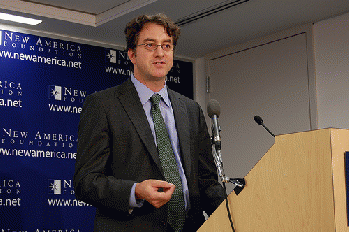Broadcast 10/31/2016 at 10:39 PM EDT (8 Listens, 11 Downloads, 1205 Itunes)
The Rob Kall Bottom Up Radio Show Podcast
| Copyright © Rob Kall, All Rights Reserved. Do not duplicate or post on youtube or other sites without express permission. Creative commons permissions for this site do not apply to audio content or transcripts of audio content. | ||||
Victor Pickard is associate professor at the Annenberg School for Communication at the University of Pennsylvania . He is author of the book America's Battle for Media Democracy: The Triumph of Corporate Libertarianism and the Future of Media Reform. He also recently wrote the piece "Media and Politics in the Age of Trump ."
Pickard said today: "AT&T's proposed acquisition of Time Warner would create a media behemoth with dangerous concentrations of political and economic power. With one corporation controlling so much production and distribution of news and entertainment media, this vertical integration poses significant potential hazards for millions of consumers and could harm the health of our democratic discourse. AT&T is already one of the nation's largest internet and phone providers, as well as the largest pay-TV operator with its recent acquisition of DirecTV. By acquiring Time Warner's media empire, which includes CNN, HBO, and Warner Bros, AT&T can privilege its own programs over competitors' and prevent other internet and cable companies from having access to them.
Such a merger deserves close regulatory scrutiny from the Justice Department. It raises serious antitrust concerns, especially since the lack of competition resulting from such mega-mergers can lead to higher costs and fewer choices for consumers. Much of the American media system is already plagued by prohibitive costs and poor services and this merger would not make things better -- indeed, it could make things considerably worse.
It could also spur a new wave of mergers between other content and distribution companies, encouraging an already highly concentrated media system to become more consolidated. In the coming weeks and months, we will no doubt hear from industry representatives that such a merger would provide many public benefits. But historically this has rarely been the case. Moreover, there's growing pressure from antitrust circles -- as well as activists and leading politicians -- to reverse the trend toward vertically-integrated oligopolies. This proposed deal may provide a crucial test case for whether the era of new media monopolies has begun to recede."
Pickard is also co-editor, with Robert McChesney, of the book Will the Last Reporter Please Turn out the Lights: The Collapse of Journalism and What Can Be Done To Fix It.
Very Rough Interview Notes
Rob: What's the problem with this merger
2 problems one has to do with democracy. I n a healthy democracy one media entity should not own so much"
This creates a massive corporate giant in our media and technology sector.
2 practical pocketbook issues. This kind of merger will likely pass on higher costs to everyday consumers in the form of paying more for phone or cable bills.
Rob: Some say that this vertical merger could save people money.
Historically, savings through efficiencies are not passed on to consumers. Look at the recent NBC Comcast merger, where savings were promised and that has not been the case.
Rob: Drill in deeper.
This is a vertical merger-- one company owns various stages of distribution and production
Also creates vulnerabilities for the company to privilege its own content.
Rob: Drill deeper into effects on Democracy. This acquisition will include CNN. The idea that it will be folded into this even larger media conglomerate.
The other area of concern is in terms of sheer power over the channels of information. Historically we always used to make sure that the same company that owned the pipes
Rob; That's already been done with Comcast owning NBC.
Fortunately we already had net neutrality passed, but companies.
Rob: Is AT& T an American controlled company.
This is outside my area of expertise. You could argue that there is a power structure that does not come down to one person.
Rob: So, all of the five biggest book publishing companies are owned by foreign corporations.
any of these large media corporations are driven by a commercial logic. Profit imperatives are driving their behavior. They are concerned about quarterly earnings.
Commercial pressures help structure media content in regard to recent politics.
Rob: is it going to become a situation where we have only one media company.
Most sectors are dominated by monopolies or oligopolies.
This is in many ways a test case on whether we will continue along this trajectory
Rob: I wrote an article about how Big is dangerous and we need to...
Elizabeth Warren called for a new anti-trust activism, a new era of breaking up monopolies. But it's going to have to take pressure from below.
You're talking about a really bottom up action. to make this happen.
Size: 6,317,552 -- 0 hrs, 13 min, 9 sec










